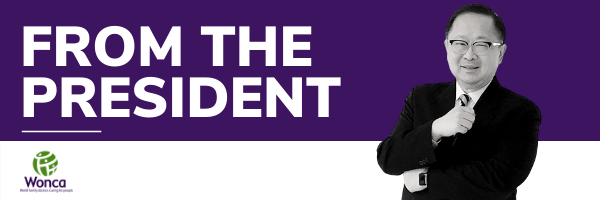From the President: May 2021
 Español Français 中文
Español Français 中文
WONCA’s suite of accreditation and certification schemes have been developed, robustly tested, refined and implemented over a period of years. WONCA accreditation helps to raise the WONCA profile by setting global standards that people can follow. They can self-check their own programmes or their own practices and can then opt to apply for accreditation, if they so wish. Having managed the development, testing and refinement of two of the accreditation processes, we have now established a formal Accreditation Committee, which I chair. Our recently retired CEO, Garth Manning, was persuaded to continue to advise on both programme accreditation and practice accreditation. He works with a panel of WONCA members who act as assessors for the different accreditation schemes. Representatives of our Working Parties on
Education and on
Quality and Safety are fully involved in the development and testing processes and are involved in the assessments, as well as being members of the Accreditation Committee. Our Past Presidents Rich Roberts and Michael Kidd have also acted as assessors.
We now have two schemes which are fully operational and one in the final development and testing phase.
Programme accreditation is intended to assess the suitability and strength of post graduate residency training programmes. It was initially intended for countries which may still be at the early stages of development of post graduate programmes, to support Colleges and Ministries to implement programmes with standards which are globally acceptable. Interestingly, some programme directors from countries with well-established and very reputable post graduate programmes have found the programme accreditation process useful for advocacy and improvement. For example, the family medicine residency training programme in University of Toronto undertook WONCA Programme accreditation, as a precursor to undergoing their national reaccreditation process and found it very useful. (
See main article for further details)
WONCA Practice Accreditation is intended primarily for practices in countries which do not yet have national standards. As with Programme Accreditation, WONCA members can access the standards to be assessed online, free of charge. Some practices use the standards as a way of checking their own quality, without taking the process any further. Other practices use the standards to inform their in-house quality assurance and quality improvement programmes. And some practices continue to the accreditation stages by engaging with our WONCA teams. As Dr Ling Qiu, Chief of Department of Family Medicine in Jiahui Health in Shanghai told us,
the WONCA Practice accreditation process has helped to set international care standards in China for quality family medicine services.
For both Programme Accreditation and Practice Accreditation, WONCA teams are also available to support Ministries of Health and Colleges to develop appropriate national standards for post graduate programmes and for family medicine practices.
In response to growing demand from our members, WONCA Executive encouraged the Working Party on
eHealth to develop a dedicated assessment framework to evaluate digital health solutions from a family medicine perspective. Having developed the assessment framework, it was then tested on the ‘Ping An Good Doctors AI Consultation System’ (PAGD), a large digital health platform, the Directors of which welcomed the evaluation. The assessment framework developed by WONCA has proven to be helpful in identifying digital solution benefits, risks and areas for improvement.
Digital Certification is now available for members to access.
Through our Working Party on
eHealth, we are helping to ensure that the latest developments in science and technology are suitable to support delivery of good quality family medicine and primary care. While we, as family doctors, recognise that nothing will ever replace the importance of the face-to-face consultation we know, from recent experience, that we have to rely on alternative means to consult with our patients at times. We want to ensure that whatever systems are developed truly reflect the interaction between family doctors and their patients. Being involved at the outset of AI consultation schemes helps to ensure that the systems being developed reflect the reality of family medicine rather than being a ‘symptom checklist’ leading to a diagnosis and treatment plan.
Please feel free to access and use our standards for
Programme Accreditation and for Practice accreditation in your own academic departments and practices. The feedback we are getting from those who have already used them is very positive!
Dr Donald Li,
WONCA President